#and yet root for Gaza???
Explore tagged Tumblr posts
Text
I was on TikTok the other day, and I saw that a page I follow posted a video MOCKINGLY making fun of the B&C… saying that little Prince Jaehaerys is serving the red of his house’s colors…. with a screenshot of the maid holding the bloody cloth…. with a laughing audio in the background. And another kicker, they have the Palestinian flag in their bio… disgusting doesn’t even cover the vileness of it all.
TRUST, I unfollowed them.
Helaena didn’t deserve what happened to her. And I highly believe Lucerys wouldn’t want that. Despite how you feel about him personally, he had kindness and he wouldn’t want that. And I don’t believe Rhaenyra wanted that either. The problem with the series is that men are entitled and horrific. Helaena and her children shouldn’t have to pay for a man’s crime.
When I say I can’t stand the team discourse and the fanatics, I’m mean for ALL. Team black and team green—- this shit is so vile. Any stupid ass who does shit like that around me will get blocked and exposed, doesn’t matter what team you’re on. Be a good person.
#I can’t stand fanatics#mocking a child’s death#and yet root for Gaza???#the irony????#I’ve seen a lot of people say with their whole CHEST being so disgusting#in this fandom#house of the dragon
17 notes
·
View notes
Text
Dear Friends
Dear Community,
I am Ahmed Abuowda,
A Palestinian citizen with roots in Khan Younis ..
A father of three children
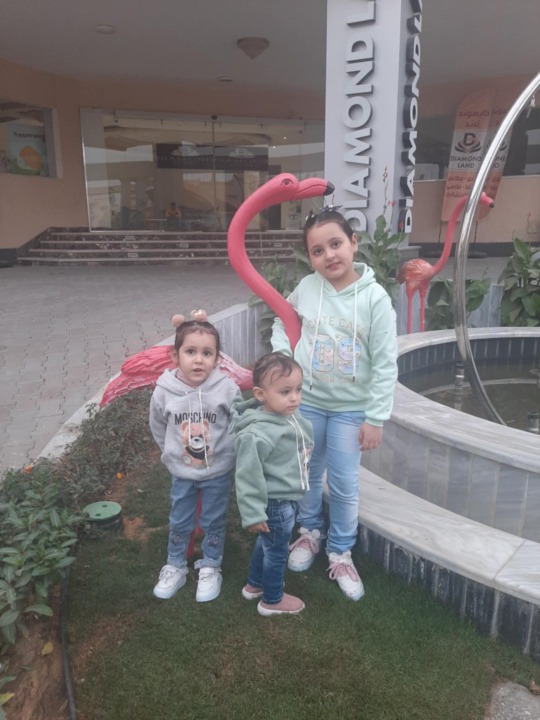
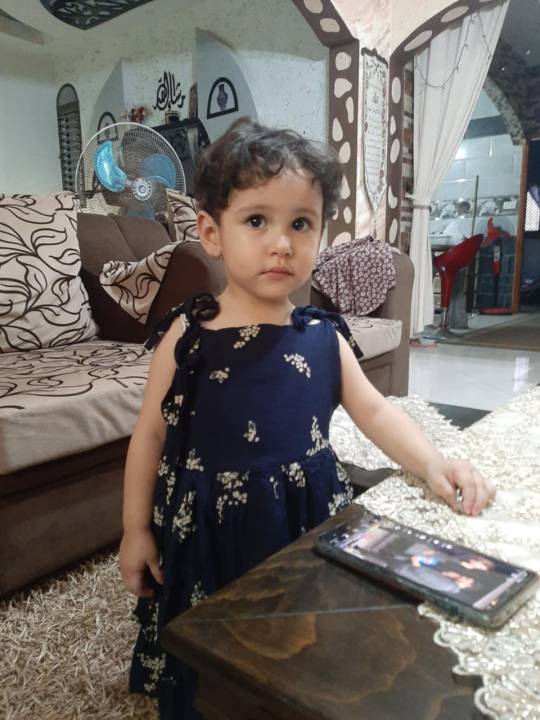
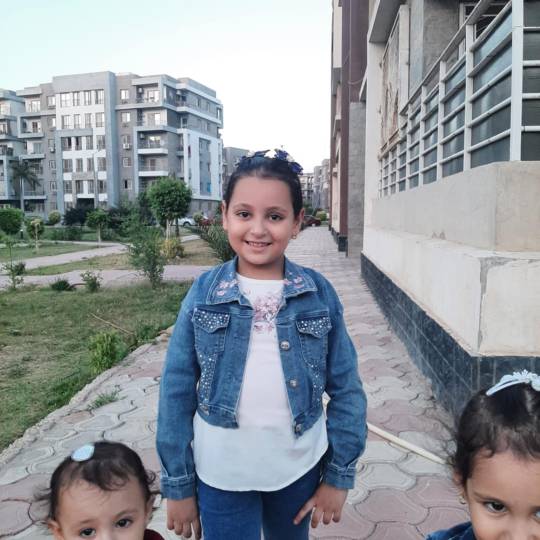
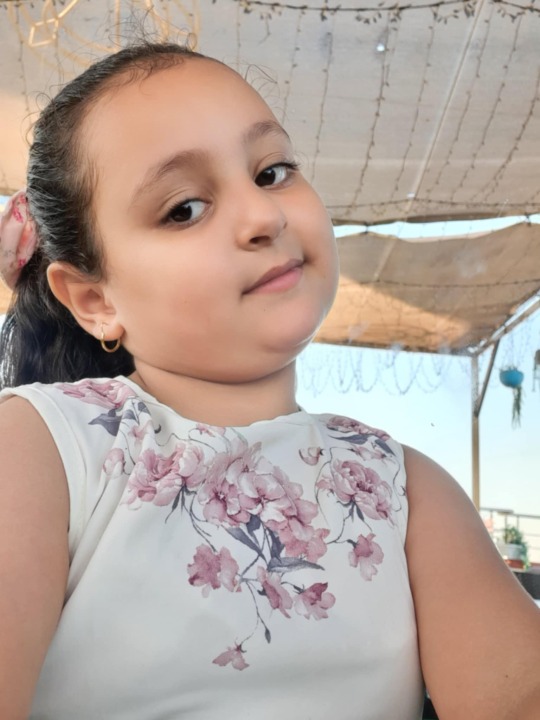
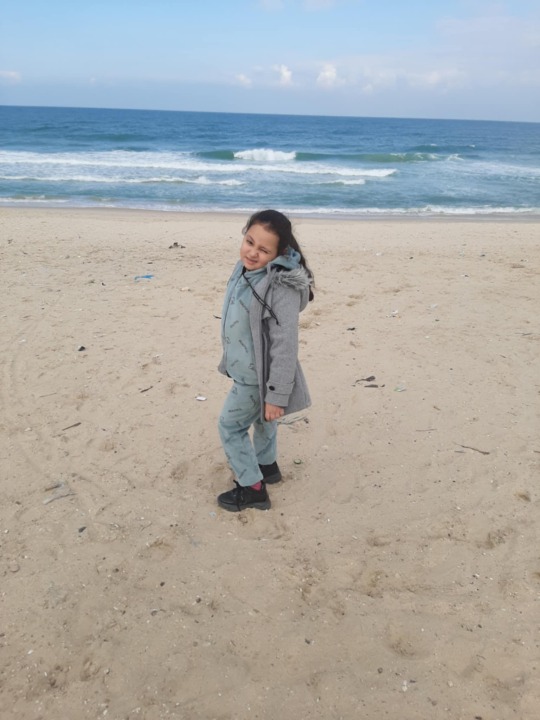
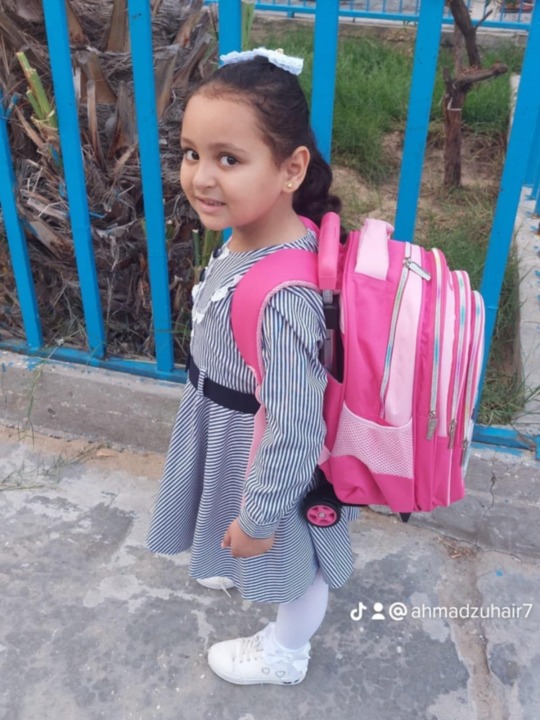
Dear Friends,
Dear Community,
I am Ahmed Abuowda,
A Palestinian citizen with roots in Khan Younis,
A father of three beautiful girls.
I have always been deeply committed to protecting human rights and helping those in need. However, the recent explosions in Gaza have shattered everything we once held dear. Our homes, filled with love and precious memories, now lie in ruins. I haven’t just lost my house, i’ve lost everything that mattered to us.
My mother's home, my appartment and all it belongings. All gone, leaving behind only painful memories.
Despite enduring so much, we remained steadfast, helping others through their own times of need.
As 2023 approaches, the basic necessity of shelter looms over us. My hope was to rebuild our lives in Khan Younis. Yet, faced with the reality that Gaza is no longer habitable, we had to seek safety and a fresh start beyond its borders. Tragically, some of our loved ones remain behind, while others have fled or perished.
Today, my family and I find ourselves in the Arab Republic of Egypt, struggling to rebuild. Without proper residency or citizenship, it has been nearly impossible to secure work or provide our children with the decent life they deserve. All our attempts to establish stability here have failed.
I humbly appeal for your support. Though I am not accustomed to asking for help, I now reach out in desperation. Your generosity no matter how small can serve as a line of hope, helping us rise from the depths of this disaster.
https://www.gofundme.com/f/help-gazan-family-to-rebuild-their-life-in-egypt?utm_campaign=fp_sharesheet&utm_medium=customer&utm_source=messenger&attribution_id=sl%3Aad2a6d77-beba-464c-9999-99d594f967f7
As the world faces its own challenges, your solidarity could be our lifeline. Please stand with us in our darkest hours as we strive to rebuild our lives and ensure the well-being of our children.
Every donation, every act of kindness, brings us one step closer to survival.
With heartfelt gratitude,
Ahmed Abuowda
#free palstine#gaza genocide#gaza gfm#gaza fundraiser#help gaza#gaza gofundme#save gaza#gazaunderattack#free gaza#gaza#gaza strip
2K notes
·
View notes
Text
Now that I know how deeply the world's hypocrisy goes with respect to Israel and its existence and how deeply the world's complete indifference to Jewish suffering runs, I see it everywhere and I can't ever go back to the naive ignorance I had before (not that I would want to).
Freed Israeli hostages testify about the absolute horrors they endured, evil beyond comprehension, and no one is listening, no one really cares.
At the same time, hundreds of thousands, millions of people are suffering and dying in Sudan, the Congo, Ukraine, China, Syria, countless elsewheres and do they get even the tiniest iota of the bandwidth of attention and compassion that Gaza gets? Where are the constant protests and social media 'awareness' campaigns for them? Nowhere, because they can't indulge the favourite pastime of demonising the Jewish state as the root of all evil ever.
Of course, Israel has its problems, like every other country on earth. No society is perfect or without it's bigotries, because that's just human nature. But it is far, far away from being the worst abuser of human rights even in that region, let alone the entire planet. Yet, no other nation on earth is as loathed, has its very existence questioned and its citizens dehumanised as incessantly.
And honestly, you really do have to be either incredibly thick or incredibly dishonest to say antisemitism has nothing at all to do with that.
288 notes
·
View notes
Text
One of the most frustrating parts of the extreme rhetoric around Israel/Palestine (besides the obvious reliance on antisemitic & anti-Arab, Islamophobic tropes) is that it exceptionalizes so many things that are actually pretty standard features of nation-states and war in a way that completely compartmentalizes the criticism of these things into just being about criticizing the “few bad apple” countries instead of criticizing the entire institution of nation-states and war as a whole.
For instance: the fact is that war kills civilians, at an alarming average of 6:1 civilians-to-combatants deaths. The status quo of war, across the board, is that way more civilians die than combatants. And yet, despite the high death toll, despite Hamas using civilian infrastructure & noncombatants as human shields (which Hamas has openly admitted to doing), despite the imprecise & destructive nature of using bombs on urban targets, and despite the inadequate humanitarian aid that has been able to make it into Gaza… the IDF has still managed to stayed well below the average of civilian casualties.
The point of saying this is not “this is what war looks like so it’s not a big deal” it’s “this is what war looks like so we as a species need to stop doing it”—seeing the devastation war has brought to the people Gaza should move you, and it should make you never want to see another war again. It should make you want a ceasefire not just for Israel and this war but all wars always. And obviously, in practice, it’s not that simple—peace is more than “just don’t do war” and the thing about ceasefires and peace treaties is they kind of have to be mutual to mean anything—but the point stands: War Bad.
However, if instead you see the destruction in Gaza and think it’s an exceptional case, where Israel is evil and the only way war could be this destructive is genocide, you get to preserve this romanticized, idealistic fantasy of war as, violent yes, but perhaps only in a cathartic, tragic-but-beautiful way—a glorious struggle where two armies clash on a battlefield far removed from everyday life and only soldiers die. You get to preserve your belief in Just War, to look forward to a morally uncomplicated Glorious Revolution™️—you may even preserve your ability to cheer on the death of Israelis.
And that’s just one issue. There are others: the claim of “ethnostate” obscures criticisms of nation-states as a concept, the claim of “apartheid” obscures criticisms of how borders & citizenship are set up across the world, etc. This inverse Israeli Exceptionalism where Israel is treated as uniquely or exceptionally problematic isn’t simply discriminatory or rooted in prejudice (which are reasons enough to criticize it, as I have), it’s actively impeding the left’s ability to criticize the actual structural systems that are the problem.
2K notes
·
View notes
Text
Redefining Antisemitism: Why All Semitic Peoples Must Be Included
For over a century, the term antisemitism has been narrowly defined to refer exclusively to prejudice and hostility toward Jewish people. While that usage is rooted in a very real and painful history—particularly the horrors of the Holocaust and the persistence of anti-Jewish sentiment across the globe—it is time to interrogate and expand the term’s definition.
Because Semitic people are not a monolith. And antisemitism, if we are honest, should not be either.
The Linguistic Truth
The term Semite refers to a broad group of people who speak or descend from speakers of Semitic languages—Hebrew, Arabic, Amharic, Aramaic, and others. This includes Jews, Arabs, Ethiopians, Assyrians, and more. The linguistic origin is clear. But over time, the term antisemitism has been exclusively applied to Jews, erasing the Semitic identity of millions of others who have also faced historic and ongoing oppression.
This isn’t just an academic oversight—it has serious ethical and political consequences.
A Weaponized Definition
Today, we see a dangerous misuse of the term antisemitism. Defending Palestinian rights, exposing war crimes, or criticizing the policies of the Israeli government can result in being labeled “antisemitic”—even when these critiques come from Arabs or other Semitic people themselves.
It is not only inaccurate to call Semitic people antisemitic for criticizing their oppression, it’s also morally absurd. The term has been twisted into a tool of suppression, used to silence legitimate resistance and shield systems of violence from accountability.
The Case of Palestine: Occupation, Apartheid, and Silence
Let’s be clear: what is happening to Palestinians under Israeli occupation is not a misunderstanding or a “complex conflict.” It is the deliberate displacement, surveillance, imprisonment, and dehumanization of an indigenous Semitic people.
• Gaza has been described as the world’s largest open-air prison. Today, it resembles a death camp.
• Between 500–700 Palestinian children are kidnapped by Israeli military forces annually, often taken from their homes at night, denied legal representation, and held in military prisons without charge.
• Palestinians are taxed by the occupying power, yet denied equal rights, legal protections, or meaningful political representation.
• Illegal Israeli settlers routinely attack Palestinian civilians under the protection—or participation—of Israeli forces.
And yet, when Palestinians speak out against this, they are told their resistance is antisemitic.
This is gaslighting at a global scale.
Expanding the Definition: A Moral Imperative
If we are going to fight antisemitism, then let us fight it in all its forms—against all Semitic peoples.
• Let us condemn the hatred and demonization of Jews wherever it occurs.
• But also condemn the dehumanization of Palestinians, Arabs, and other Semitic groups who are treated as second-class citizens, occupiable, bombable, and disposable.
This is not about minimizing Jewish suffering—it’s about recognizing that antisemitism cannot be a one-way street. When we exclude Arab Semites from the protection of this term, we reinforce a hierarchy of whose lives, whose languages, and whose lineages are worth defending.
Toward an Inclusive Framework
It is time for our language to reflect our values. The fight against hate must be principled, not political. If antisemitism means the hatred, marginalization, or violent erasure of Semitic people, then Palestinians must be included in that struggle—not criminalized for surviving it.
Reclaiming the full scope of antisemitism is not just about semantics. It’s about justice, solidarity, and truth.
And no liberation movement is complete if it erases others along the way.
#antisemitism#SemiticPeoples#Palestine#RedefiningAntisemitism#HumanRights#FreePalestine#DecolonizeLanguage#SemiticSolidarity#OccupationalViolence#EthnicJustice#IsraeliApartheid#SettlerColonialism#ChildrenInPrison#LanguageMatters#OppressionNarratives#SocialJustice#Activism#JusticeForAll
248 notes
·
View notes
Text
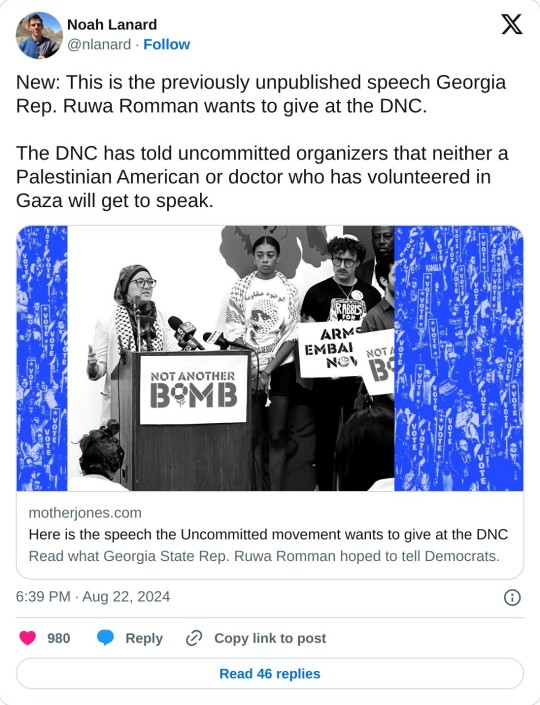
My name is Ruwa Romman, and I’m honored to be the first Palestinian elected to public office in the great state of Georgia and the first Palestinian to ever speak at the Democratic National Convention. My story begins in a small village near Jerusalem, called Suba, where my dad’s family is from. My mom’s roots trace back to Al Khalil, or Hebron. My parents, born in Jordan, brought us to Georgia when I was eight, where I now live with my wonderful husband and our sweet pets.
Growing up, my grandfather and I shared a special bond. He was my partner in mischief—whether it was sneaking me sweets from the bodega or slipping a $20 into my pocket with that familiar wink and smile. He was my rock, but he passed away a few years ago, never seeing Suba or any part of Palestine again. Not a day goes by that I don’t miss him.
This past year has been especially hard. As we’ve been moral witnesses to the massacres in Gaza, I’ve thought of him, wondering if this was the pain he knew too well. When we watched Palestinians displaced from one end of the Gaza Strip to the other I wanted to ask him how he found the strength to walk all those miles decades ago and leave everything behind.
But in this pain, I’ve also witnessed something profound—a beautiful, multifaith, multiracial, and multigenerational coalition rising from despair within our Democratic Party. For 320 days, we’ve stood together, demanding to enforce our laws on friend and foe alike to reach a ceasefire, end the killing of Palestinians, free all the Israeli and Palestinian hostages, and to begin the difficult work of building a path to collective peace and safety. That’s why we are here—members of this Democratic Party committed to equal rights and dignity for all. What we do here echoes around the world.
They’ll say this is how it’s always been, that nothing can change. But remember Fannie Lou Hamer—shunned for her courage, yet she paved the way for an integrated Democratic Party. Her legacy lives on, and it’s her example we follow.
But we can’t do it alone. This historic moment is full of promise, but only if we stand together. Our party’s greatest strength has always been our ability to unite. Some see that as a weakness, but it’s time we flex that strength.
Let’s commit to each other, to electing Vice President Harris and defeating Donald Trump who uses my identity as a Palestinian as a slur. Let’s fight for the policies long overdue—from restoring access to abortions to ensuring a living wage, to demanding an end to reckless war and a ceasefire in Gaza. To those who doubt us, to the cynics and the naysayers, I say, yes we can—yes we can be a Democratic Party that prioritizes funding our schools and hospitals, not for endless wars. That fights for an America that belongs to all of us—Black, brown, and white, Jews and Palestinians, all of us, like my grandfather taught me, together.
I want to be clear,” Romman said. “We’ve been in negotiations for days. This did not just come up…We’ve been talking about this for at least a week. In addition, the campaign told us that not getting a ‘no’ [initially upon first hearing the request] was a really good sign. For them to give us a ‘no’ the same day that Geoff Duncan [a Republican from Georgia] was on the stage—especially when it was my name—was just absolutely a slap in the face.”
467 notes
·
View notes
Text
The Uncommitted Movement and Uncommitted Delegates have been petitioning to have just one Palestinian-American speak at the DNC for months; among a sea of speakers, including a random border patrol agent, Trump voters, and the CEO of Uber.
They were told three words and no other explanation: "It's a no."
The delegates and Palestine protesters have been working tirelessly to get the DNC to rescind this decision on the last day of the convention and apply pressure. There is only one ethnic background that is not allowed to speak at the DNC, and that is Palestinians.
Georgia State Representative Ruwa Romman is at the top of the list of Palestinian democrats that were offered— of which the Uncommitted Movement and delegates generously offered the DNC to take their pick.
In case they don't let her speak, this is her speech.
"My name is Ruwa Romman, and I’m honored to be the first Palestinian elected to public office in the great state of Georgia and the first Palestinian to ever speak at the Democratic National Convention. My story begins in a small village near Jerusalem, called Suba, where my dad’s family is from. My mom’s roots trace back to Al Khalil, or Hebron. My parents, born in Jordan, brought us to Georgia when I was eight, where I now live with my wonderful husband and our sweet pets.
Growing up, my grandfather and I shared a special bond. He was my partner in mischief—whether it was sneaking me sweets from the bodega or slipping a $20 into my pocket with that familiar wink and smile. He was my rock, but he passed away a few years ago, never seeing Suba or any part of Palestine again. Not a day goes by that I don’t miss him.
This past year has been especially hard. As we’ve been moral witnesses to the massacres in Gaza, I’ve thought of him, wondering if this was the pain he knew too well. When we watched Palestinians displaced from one end of the Gaza Strip to the other I wanted to ask him how he found the strength to walk all those miles decades ago and leave everything behind.
But in this pain, I’ve also witnessed something profound—a beautiful, multifaith, multiracial, and multigenerational coalition rising from despair within our Democratic Party. For 320 days, we’ve stood together, demanding to enforce our laws on friend and foe alike to reach a ceasefire, end the killing of Palestinians, free all the Israeli and Palestinian hostages, and to begin the difficult work of building a path to collective peace and safety. That’s why we are here—members of this Democratic Party committed to equal rights and dignity for all. What we do here echoes around the world.
They’ll say this is how it’s always been, that nothing can change. But remember Fannie Lou Hamer—shunned for her courage, yet she paved the way for an integrated Democratic Party. Her legacy lives on, and it’s her example we follow.
But we can’t do it alone. This historic moment is full of promise, but only if we stand together. Our party’s greatest strength has always been our ability to unite. Some see that as a weakness, but it’s time we flex that strength.
Let’s commit to each other, to electing Vice President Harris and defeating Donald Trump who uses my identity as a Palestinian as a slur. Let’s fight for the policies long overdue—from restoring access to abortions to ensuring a living wage, to demanding an end to reckless war and a ceasefire in Gaza. To those who doubt us, to the cynics and the naysayers, I say, yes we can—yes we can be a Democratic Party that prioritizes funding our schools and hospitals, not for endless wars. That fights for an America that belongs to all of us—Black, brown, and white, Jews and Palestinians, all of us, like my grandfather taught me, together."
357 notes
·
View notes
Text
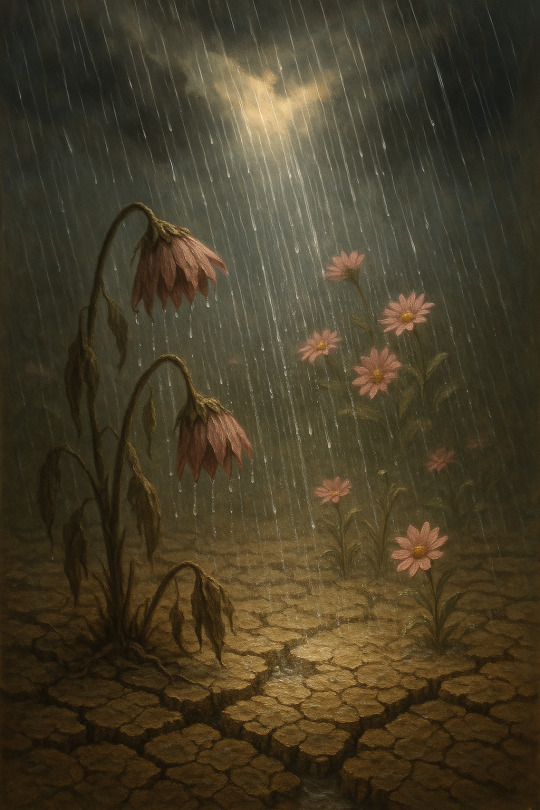
Once, there was a small garden that bloomed with colors and life. Birds sang in its branches, and butterflies danced among the flowers. But one season, the rain forgot to come. The sun scorched the earth, and the flowers began to droop. The soil , the leaves turned yellow, and the once joyful garden grew silent—on the brink of death.
Every morning, the garden looked up to the empty sky, longing for a drop of mercy. Days passed, and hope began to fade—until one day, clouds gathered. Thunder rolled, and the first drop fell. Then came another, and another, until the sky opened with blessings. Rain poured over the garden like heaven's tears, soaking the dry soil, waking the roots, and reviving the flowers. Life returned, slowly but surely, and the garden smiled again.
This garden is Gaza. We are its roots, its flowers, its soul. For months, we have withered under the harshest war and unimaginable suffering. Yet, like the garden, we lift our eyes to the sky, waiting for God's mercy to rain upon us—believing that His help is near, and that no matter how long the drought lasts, the rain will come. And when it does, we will bloom again.
To those who extend their hands with kindness and generosity—thank you. Your support is like the first drops of rain, giving us strength to hold on, to keep believing. In your compassion, we find the courage to hope, and in your humanity, we see the promise of a brighter tomorrow.
88 notes
·
View notes
Text
Imagine standing at the edge of your future, diploma in hand, ready to step into the life you’ve worked so hard to build…only to have it all crumble beneath the roar of warplanes and the smoke of relentless bombardment.
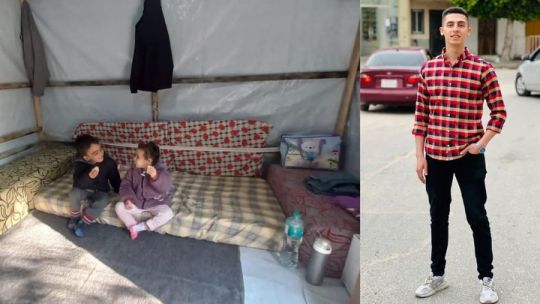
Image: Yousef is still trying to provide for his family amid unimaginable loss.
Story by @rumiandroses
For 23-year-old Yousef, 2024 was supposed to mark the beginning of a new chapter. A recent graduate living in Gaza, he had dreams of work, independence, and building a future—not just for himself, but for his entire family. Instead, he now finds himself caught in a relentless cycle of violence, loss, and survival.
“The occupation destroyed my dream, my future, and the dreams of all my family members,” Yousef shares on his GoFundMe page.
Yousef is one of 13 family members—including his parents, siblings, nieces, and nephews—who have been displaced from their home under the constant threat of bombardment. His sister gave birth recently, but the newborn has no clothes, no diapers, and no safe place to rest. His other sisters no longer attend school—every school they once knew lies in ruins.
They've lost so many family members—in the span of two months alone, Yousef lost his uncle and cousins to brutal attacks.
Their home has been reduced to rubble, and basic necessities like clean water, food, and medical care are nearly impossible to come by. The family has been forced to flee multiple times, first from Gaza City to Khan Yunis, and then to Rafah, each move driven by intensifying strikes and the desperate hope of finding safety.
“No place is safe in Gaza Strip,” Yousef writes. “The drinking water is not suitable for drinking. We’re suffering from diseases, pollution, lack of water, and food. We do not even have medicine for treatment.”
Their only remaining hope lies in crossing through the Rafah border—a passage controlled jointly by Egypt and Palestine, requiring a steep fee of $5,000 USD per person. For Yousef and his family, this cost is impossible for them to pay on their own.
Despite the hardship, Yousef writes with humility and resolve: “Any contribution, large or small, brings us closer to ensuring the safety and well-being of our children. Let us live a happy, safe life… and keep them away from all this pain, destruction, and siege.”
He dreams of a life free from fear, a place where his family can heal, and where his hopes for the future can take root again.
His plea is simple, yet heartbreaking: “Help us get out of the most dangerous place in the world and start a new life.”
You can donate to Yousef’s GoFundMe [HERE].
#free gaza#gaza#free palestine#gaza genocide#gaza strip#palestine#gofundme#signal boost#the human family#humanity
75 notes
·
View notes
Text
What does it mean that the war is over?
It's not over yet. I'm sorry, I made a mistake.
I meant...
What does it mean that the ceasefire has been lifted?
What nonsense!
My heart is still tired, really what is this!?
More tired than before
Nothing has changed and I don't feel that there is any noticeable progress or change.
My life is at a standstill
Nothing is good so far..
No comfort, no stability, no sense of security.
I always have a feeling of suffocation in my chest
Faintness from everything
I don't know if I'm just beginning to enter a state of depression or if it is pessimism about everything around me.
I don't really know how I feel about this matter, honestly.
All I know is that nothing there was comforting me except nature.
The sky is blue like a pure dream, with clouds swaying above it like pieces of cotton escaping from the pillows of dreams.
The land stretches green, adorned with pink trees as if it were a painting drawn by the brush of an artist who loves spring colors
The gentle breezes of the air.
And the sea playing with its waves as if it were whispering its eternal desire to stay and leave together.
I almost forgot myself whenever I contemplated the details of the entire universe as if it were playing a complete symphony of beauty.
Suddenly everything became gray
Yes, we were poured into blackness after we had colors.
I think they took that away too.
They took away everything
I started trying as much as possible to avoid the piles of rubble and ignore the gray color that surrounds me from every side and everywhere but..
To no avail.
I started feeling extremely sad whenever I saw the burned trees uprooted from their roots.
Whenever my eyes fell on their huge roots that split the ground and floated above its surface, I felt that something inside me was being uprooted, as if I was the one whose roots were being exposed, exposed to the cruelty of time. The pain in my chest intensifies, and sadness grows heavier on my soul, as if those trees reflect the cracks and wounds inside me.
The sea that I always loved sitting in front of for hours, that friend that I always escape to, I'm tired of it
You know,
Even the sea and I are at odds now.
The fresh air that I bet there is no air like this in the whole world,
They polluted it
They put poison in it
I no longer feel its gentle breezes penetrating my lungs as before.
It became filled with the smell of gunpowder.
All that remains is the far, far away
And it is my only sky
Although it has paled a lot, that's okay.
That's why I started running away with my eyes far from here..
I abandoned the trees
I left my inhalation and exhalation
And I quarreled with the sea
Only looking up
Only the sky..
Only the sky.
I'm really tired💔
Instantaneous writings, I called it..
"If only they hadn't done all this"
By me and on the occasion of International Women's Day
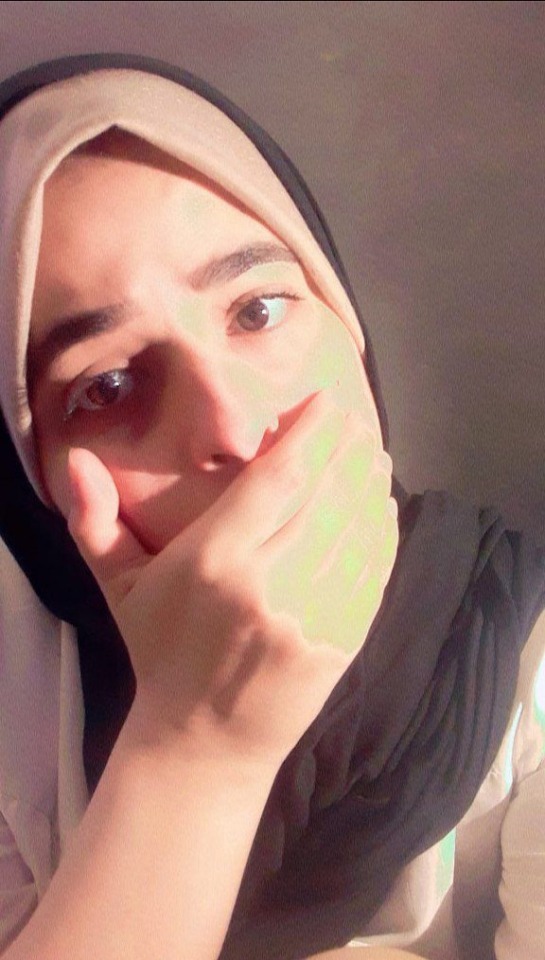
forbidden to speak..!! 🫢❌
✅️Vetted by @gazavetters, my number verified on the list is ( #502 )✅️ & @bilal-salah0
124 notes
·
View notes
Text
We come alongside fellow Christians in condemning all attacks on civilians, especially defenseless families and children. Yet, we are disturbed by the silence of many church leaders and theologians when it is Palestinian civilians who are killed. We are also horrified by the refusal of some western Christians to condemn the ongoing Israeli occupation of Palestine, and, in some instances, their justification of and support for the occupation. Further, we are appalled by how some Christians have legitimized Israel’s ongoing indiscriminate attacks on Gaza, which have, so far, claimed the lives of more than 3,700 Palestinians, the majority of whom are women and children. These attacks have resulted in the wholesale destruction of entire neighborhoods and the forced displacement of over one million Palestinians. The Israeli military has utilized tactics that target civilians such as the use of white phosphorus, the cutting off of water, fuel, and electricity, and the bombardment of schools, hospitals, and places of worship—including the heinous massacre at the Greek Orthodox Church of Saint Porphyrios which wiped out entire Palestinian Christian families. Moreover, we categorically reject the myopic and distorted Christian responses that ignore the wider context and the root causes of this war: Israel’s systemic oppression of the Palestinians over the last 75 years since the Nakba, the ongoing ethnic cleansing of Palestine, and the oppressive and racist military occupation that constitutes the crime of apartheid. This is precisely the horrific context of oppression that many western Christian theologians and leaders have persistently ignored, and even worse, have occasionally legitimized using a wide range of Zionist theologies and interpretations. Moreover, Israel’s cruel blockade of Gaza for the last 17 years has turned the 365-square-kilometer Strip into an open-air prison for more than two million Palestinians—70% of whom belong to families displaced during the Nakba—who are denied their basic human rights. The brutal and hopeless living conditions in Gaza under Israel’s iron fist have regrettably emboldened extreme voices of some Palestinian groups to resort to militancy and violence as a response to oppression and despair. Sadly, Palestinian non-violent resistance, which we remain wholeheartedly committed to, is met with rejection, with some western Christian leaders even prohibiting the discussion of Israeli apartheid as reported by Human Rights Watch, Amnesty International, and B’Tselem, and as long asserted by both Palestinians and South Africans.
An Open Letter from Palestinian Christians to Western Church Leaders and Theologians
705 notes
·
View notes
Text
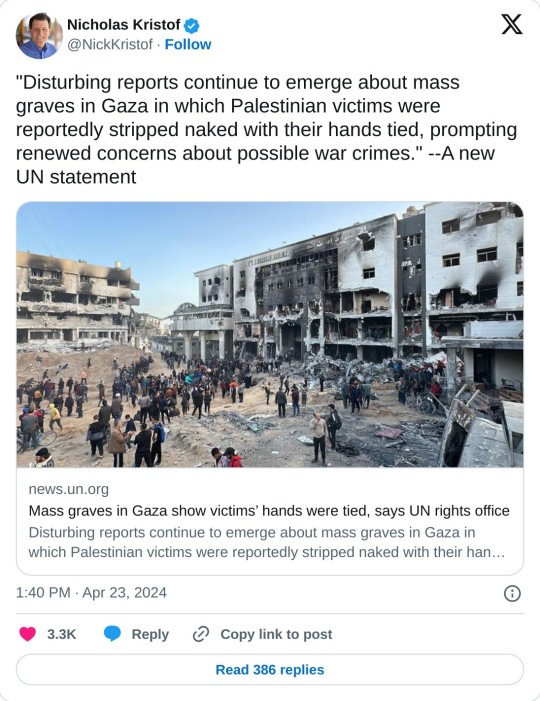
The development follows the recovery of hundreds of bodies “buried deep in the ground and covered with waste” over the weekend at Nasser Hospital in Khan Younis, central Gaza, and at Al-Shifa Hospital in Gaza City in the north. A total of 283 bodies were recovered at Nasser Hospital, of which 42 were identified. “Among the deceased were allegedly older people, women and wounded, while others were found tied with their hands…tied and stripped of their clothes,” said Ravina Shamdasani, spokesperson for the UN High Commissioner for Human Rights. Al-Shifa discovery Citing the local health authorities in Gaza, Ms. Shamdasani added that more bodies had been found at Al-Shifa Hospital. The large health complex was the enclave’s main tertiary facility before war erupted on 7 October. It was the focus of an Israeli military incursion to root out Hamas militants allegedly operating inside which ended at the beginning of this month. After two weeks of intense clashes, UN humanitarians assessed the site and confirmed on 5 April that Al-Shifa was “an empty shell”, with most equipment reduced to ashes. “Reports suggest that there were 30 Palestinian bodies buried in two graves in the courtyard of Al-Shifa Hospital in Gaza City; one in front of the emergency building and the others in front of the dialysis building,” Ms. Shamdasani told journalists in Geneva. The bodies of 12 Palestinians have now been identified from these locations at Al-Shifa, the OHCHR spokesperson continued, but identification has not yet been possible for the remaining individuals. “There are reports that the hands of some of these bodies were also tied,” Ms. Shamdasani said, adding that there could be “many more” victims, “despite the claim by the Israeli Defense Forces to have killed 200 Palestinians during the Al-Shifa medical complex operation”.
#yemen#jerusalem#tel aviv#current events#palestine#free palestine#gaza#free gaza#news on gaza#palestine news#news update#war news#war on gaza#al shifa hospital#nasser hospital#nasser medical complex#gaza genocide#genocide#war crimes
275 notes
·
View notes
Note
Warning: long-ass essay incoming
Recently I’ve become fascinated with procrastiel. His journey from shipping DT/MS and basically ignoring their wives (I thought it was preferable to constant wife bashing as tinhatter behaviors go) to starting actively root against DT while heaping praise on MS seems so… well, fascinating. In his mind apparently DT despite being gay rejected MS because of his (DT) cowardice, conformism and the evil allure of heteronormativity. Somehow, MS is still a gay hero (despite continuing to live with his girlfriend and kids as before) with a broken heart, while DT is described in mostly derogatory/quietly melancholic terms, he’s a traitor, a hypocrite and a coward in ALL aspects of his life, he also immediately became far less handsome or talented than Michael. Lol. Because that’s what all tinhatters (and right-wingers too btw) invariably do: the person they hate becomes the vessel of everything unappealing. See how they describe Georgia and Anna – they have no redeeming qualities, they’re not even pretty lol. All their dresses are unfortunate, and they looked much better 2-7 years ago than they do now, what happened? lol.
I especially liked the latest from procrastiel at snark central, commenting on the post about G and D’s agent who’s an open Zionist. Frankly, it was the only ever post from that account I could partly agree with, even if I knew that they only wrote it to kick G (and D, because he’s also not in their good graces lately). I too think they probably keep mostly mum on the Gaza topic due to having some Jewish (and more or less Zionist) friends they don’t want to upset. Not ideal, I agree. But I’m also against this modern trend of expecting celebs to speak out and have a clear stance on EVERY political topic and hounding them if they don’t.
Tbh, for me the deal breaker might be if they DO speak out FOR something disgusting (to me), then they usually lose the appeal. So as long as they don’t give any indication that they are PRO genocide (or other issues, which are distasteful to me), I don’t really have any problem with them tbh. I don’t have a clear stance on all political issues (even the Gaza – Izrael one, I can’t tell you in detail how exactly I see the fair resolution, I just see that modern Zionism is undisguised fascism), so I don’t feel that it’s fair to demand it of random people I never met just because they sing or act well.
But I was… there it is again – fascinated with procrastiel’s reply to that post. He basically explains what it takes to be a principled human, and that’s courage to be unlikable and go against the ruling opinion, even if your occupation depends on being liked. And he concludes based on this that Michael ‘takes the crown when it comes to supporting others’ while David and Georgia are ‘pussies’. Literally.
Hmmm, excuse me? I mean. I absolutely believe that MS is a principled person and that he CAN go against the ruling opinion and is not afraid of being unlikable. But what procrastiel is referring to here, now? There’s hardly a more hated and verbally abused by the right-wingers celebrity in the UK than DT (and his wife). All because of their pro-trans stance, which is exactly that – going against the ruling opinion and not being afraid of becoming unlikable. What did Michael do to become the unwitting hero of this comparison? He bought out people’s debt, for which he was grudgingly praised even by some right-wingers, who immediately concluded that he’s “at least better than his mate, that women-hating, troon-loving Tennant”. So what was the meaning of procrastiel’s lecture? I didn’t get it. To my knowledge Michael didn’t state anything else on Gaza, he didn’t make any divisive comments recently, he was a pure angel and goodie-two-shoes. And then there are David and Georgia, who continually make waves with pro-trans statements, receiving vicious verbal abuse on socials and in media. Yet these people for procrastiel are pussies who have no courage to make themselves unlikable and endanger their popularity. While Michael who’s just been named as one of Time magazine's 100 innovators in Philanthropy is apparently a rebel who doesn’t care about people’s opinions.
Like I said already, it’s not about Michael vs. David, they are both deserving of praise equally imo. It’s just so very odd to make this comparison CURRENTLY and come to these odd conclusions. Procrastiel always seemed to ignore Georgia’s pro-trans stance, like it didn’t exist, but this comment just makes it clear that he doesn’t really care about the reality of anyone’s stances. David lost procrastiel’s favour because he’s not gay enough, so now the reality gets rewritten and David (+ Georgia of course) was always a coward, he’s a pussy in all aspects of his life, he doesn’t make any political statements because he’s too afraid of losing his popularity, he and his wife simply don’t talk on any controversial topics. Michael does all that. Some people hate him for it, but he follows his principles and has no fucks to give. Look at this… mmm… Time magazine issue! See how metal it is? That pussy David can only hide behind his wife’s skirts and keep silent about everything!
When I read it I felt like we’re from parallel universes tbh. The end.
this pretty much sums it up but also: Georgia has spoken out about Palestine, and honestly if you have a boss somewhere or a coworker somewhere they are probably a Zionist. This account is staunchly anti-Zionism though so if we have any stragglers they can see themselves out. Someone else’s political stance does not equal to David and Georgia’s. Also the fact that these are her links make it pretty clear that they aren’t zionists

something else you also bring up here is a really good point. Michaels activism currently isn’t going against any major narratives. David and Georgia are constantly battling for their child’s safety and the safety of other trans youth in the UK. What Michael’s doing is still fantastic, but they only act like David’s a coward because they headcanoned him as gay and he’s made it clear that he isn’t. David isn’t playing the role of little abused boy and they’re big mad.
(iirc that agent is also involved with Nicola coughlan who is very pro Palestine so…procrastiels scathing callout makes even less sense. He lives in an internet world.)
38 notes
·
View notes
Text
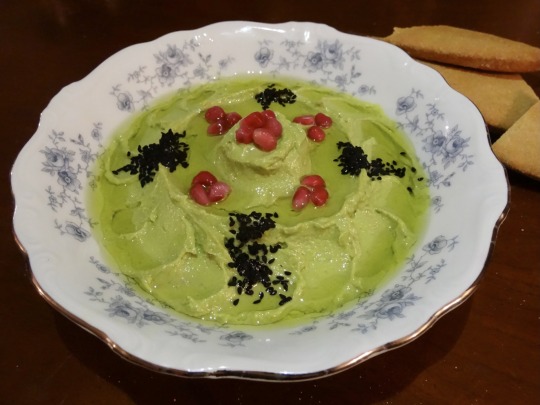
[ID: A bowl of avocado spread sculpted into a pattern, topped with olive oil and garnished with symmetrical lines of nigella seeds and piles of pomegranate seeds; a pile of pita bread is in the background. End ID]
متبل الأفوكادو / Mutabbal al-'afukadu (Palestinian avocado dip)
Avocados are not native to Palestine. Israeli settlers planted them in Gaza in the 1980s, before being evicted when Israel evacuated all its settlements in Gaza in 2005. The avocados, however, remained, and Gazans continued to cultivate them for their fall and winter harvest. Avocados have been folded into the repertoire of a "new" Palestinian cuisine, as Gazans and other Palestinians have found ways to interpret them.
Palestinians may add local ingredients to dishes traditionally featuring avocado (such as Palestinian guacamole, "جواكامولي فلسطيني" or "غواكامولي فلسطيني"), or use avocado in Palestinian dishes that typically use other vegetables (pickling them, for example, or adding them to salads alongside tomato and cucumber).
Another dish in this latter category is حمص الافوكادو (hummus al-'afukadu)—avocado hummus—in which avocado is smoothly blended with lemon juice, white tahina (طحينة البيضاء, tahina al-bayda'), salt, and olive oil. Yet another is متبّل الأفوكادو (mutabbal al-'afukadu). Mutabbal is a spiced version of بابا غنوج (baba ghannouj): "مُتَبَّل" means "spiced" or "seasoned," from "مُ" "mu-," a participlizing prefix, + "تَبَّلَ" "tabbala," "to have spices added to." Here, fresh avocado replaces the roasted eggplant usually used to make this smooth dip; it is mixed with green chili pepper, lemon juice, garlic, white tahina, sumac, and labna (لبنة) or yoghurt. Either of these dishes may be topped with sesame or nigella seeds, pomegranate seeds, fresh dill, or chopped nuts, and eaten with sliced and toasted flatbread.
Avocados' history in Palestine precedes their introduction to Gaza. They were originally planted in 1908 by a French order of monks, but these trees have not survived. It was after the Balfour Declaration of 1917 (in which Britain, having been promised colonial control of Palestine with the dissolution of the Ottoman Empire after World War 1, pledged to establish "a national home for the Jewish people" in Palestine) that avocado agriculture began to take root.
In the 1920s, 30s, and 40s, encouraged by Britain, Jewish Europeans began to immigrate to Palestine in greater numbers and establish agricultural settlements (leaving an estimated 29.4% of peasant farming families without land by 1929). Seeds and seedlings from several varieties of avocado were introduced from California by private companies, research stations, and governmental bodies (including Mikveh Israel, a school which provided settlers with agricultural training). In these years, prices were too high for Palestinian buyers, and quantities were too low for export.
It wasn't until after the beginning of the Nakba (the ethnic cleansing of Palestinians from "Jewish" areas following the UN partition of Palestine in 1947) that avocado plantings became significant. With Palestinians having been violently expelled from most of the area's arable land, settlers were free to plant avocados en masse for export, aided (until 1960) by long-term, low-interest loans from the Israeli government. The 400 acres planted within Israel's claimed borders in 1955 ballooned to 2,000 acres in 1965, then 9,000 by 1975, and over 17,000 by 1997. By 1986, Israel was producing enough avocados to want to renegotiate trade agreements with Europe in light of the increase.
Israeli companies also attained commercial success selling avocados planted on settlements within the West Bank. As of 2014, an estimated 4.5% of Israeli avocado exports were grown in the occupied Jordan Valley alone (though data about crops grown in illegal settlements is of course difficult to obtain). These crops were often tended by Palestinian workers, including children, in inhumane conditions and at starvation wages. Despite a European Union order to specify the origin of such produce as "territories occupied by Israel since 1967," it is often simply marked "Israel." Several grocery stores across Europe, including Carrefour, Lidl, Dunnes Stores, and Aldi, even falsified provenance information on avocados and other fruits in order to circumvent consumer boycotts of goods produced in Israel altogether—claiming, for example, that they were from Morocco or Cyprus.
Meanwhile, while expanding its own production of avocados, Israel was directing, limiting, and destabilizing Palestinian agriculture in an attempt to eliminate competition. In 1982, Israel prohibited the planting of fruit trees without first obtaining permission from military authorities; in practice, this resulted in Palestinians (in Gaza and the West Bank) being entirely barred from planting new mango and avocado trees, even to replace old, unproductive ones.
Conditions worsened in the years following the second intifada. Between September of 2000 and September of 2003, Israeli military forces destroyed wells, pumps, and an estimated 85% of the agricultural land in al-Sayafa, northern Gaza, where farmers had been using irrigation systems and greenhouses to grow fruits including citrus, apricots, and avocados. They barred almost all travel into and out of al-Sayafa: blocking off all roads that lead to the area, building barricades topped with barbed wire, preventing entry within 150 meters of the barricade under threat of gunfire, and opening crossings only at limited times of day and only for specific people, if at all.
A July 2001 prohibition on Palestinian vehicles within al-Sayafa further slashed agricultural production, forcing farmers to rely on donkeys and hand carts to tend their fields and to transport produce across the crossing. If the crossing happened to be closed, or the carts could not transport all the produce in time, fruits and vegetables would sit waiting in the sun until they rotted and could not be sold. The 2007 blockade worsened Gaza's economy still further, strictly limiting imports and prohibiting exports entirely (though later on, there would be exceptions made for small quantities of specific crops).
In the following years, Israel allowed imports of food items into Gaza not exceeding the bare minimum for basic sustenance, based on an estimation of the caloric needs of its inhabitants. Permitted (apples, bananas, persimmons, flour) and banned items for import (avocados, dates, grapes) were ostensibly based on "necessary" versus "luxury" foods, but were in fact directed according to where Israeli farmers could expect the most profit.
Though most of the imports admitted into Gaza continued to come from Israel, Gazan farmers kept pursuing self-sufficiency. In 2011, farmers working on a Hamas-government-led project in the former settlements produced avocados, mangoes, and most of the grapes, onions, and melons that Gazans ate; by 2015, though still forbidden from exporting excess, they were self-sufficient in the production of crops including onions, watermelon, cantaloupe, grapes, almonds, olives, and apples.
Support Palestinian resistance by calling Elbit System’s (Israel’s primary weapons manufacturer) landlord, donating to Palestine Action’s bail fund, and donating to the Bay Area Anti-Repression Committee bail fund.
Ingredients:
2 medium avocados (300g total)
1/4 cup white tahina
2 Tbsp labna (لبنة), or yoghurt (laban, لبن رايب)
1 green chili pepper
2 cloves garlic
2 Tbsp good olive oil
Juice of 1/2 lemon (1 1/2 Tbsp)
1 tsp table salt, or to taste
Pomegranate seeds, slivered almonds, pine nuts, chopped dill, nigella seeds, sesame seeds, sumac, and/or olive oil, to serve
Khubiz al-kmaj (pita bread), to serve
Instructions:
1. In a mortar and pestle, crush garlic, pepper, and a bit of salt into a fine paste.
2. Add avocados and mash to desired texture. Stir in tahina, labna, olive oil, lemon juice, and additional salt.
You can also combine all ingredients in a blender or food processor.
3. Top with a generous drizzle of olive oil. Add toppings, as desired.
4. Cut pita into small rectangles or triangles and separate one half from the other (along where the pocket is). Toast in the oven, or in a large, dry skillet, stirring occasionally, until golden brown. Serve dip alongside toasted pita chips.
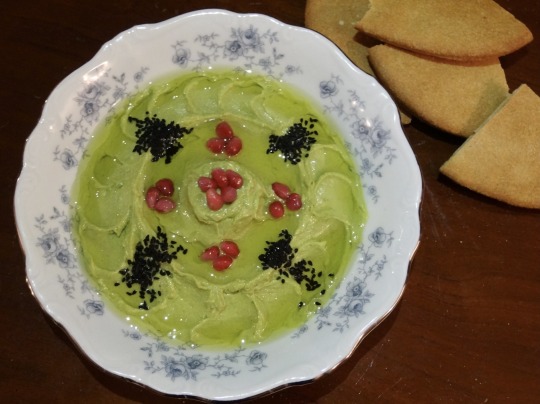
489 notes
·
View notes
Text
Every week we are reading about professions that are pushing out Zionist Jews from their fields.
In the field of international law:
...The professor saw a trend among the topics Israeli and Jewish colleagues were pushed to pursue. Those who continued their academic work in international law either wrote about Palestinians as victims or Israel’s violations of humanitarian international law. “Israelis would either write about IP law or business law, or about how Israel is being awful, violating human rights and all of that.”
This stood out because the professor noticed their colleagues from Latin America and China weren’t expected to work on topics that criticize their home countries as a condition for receiving faculty support. Yet when it came to Israelis, it was “clear to us this is what we need to deliver on.”
In the professor’s discussions with the senior faculty, especially the progressive liberal Jewish faculty, it came through clearly that support for Israeli students was conditioned on being the right type of Israeli, “and there were fellowships and scholarships and grants available to students who are willing to do that. In Hebrew we say that a person knows which side of the bread is buttered, right? So it’s pretty clear what pays off is to distance yourself from a mainstream Israeli kind of discourse.”
Understanding who holds the power and influences decisions is important in any profession, the law included. “You need to have the support and the mentors to advance in your career,” the professor explained, “and for that, you look for cues on what should I do, how do I make these people like me. Why would you bother, why would you take the risk of saying something that is controversial or put yourself in the position of protecting Israel or speaking on behalf of Israel when there is only a price to pay for that?”
“For example, there is an institute that gives out scholarships to doctoral students who are writing dissertations about Israel. I was advised not to take their money because then it’s going to be on my CV and people will interpret that as if I don’t have the right kind of politics. So even when there are economic incentives to write different kinds of scholarship,” under the current academic incentives, the professor concludes, scholarships and point-interventions will not work “because it’s more about selection and authority and networks and connections and less about economic incentives.”
Mental health professionals:
The anti-Zionist blacklist is the most extreme example of an anti-Israel wave that has swept the mental health field since the Oct. 7 Hamas terror attacks and the resulting war in Gaza, which has seen the deaths of thousands of Palestinian civilians. More than a dozen Jewish therapists from across the country who spoke to Jewish Insider described a profession ostensibly rooted in compassion, understanding and sensitivity that has too often dropped those values when it comes to Jewish and Israeli providers and clients.
At best, these therapists say their field has been willing to turn a blind eye to the antisemitism that they think is too rampant to avoid. At worst, they worry the mental health profession is becoming inhospitable to Jewish practitioners whose support for Israel puts them outside the prevailing progressive views on the Israeli-Palestinian conflict.
Authors:
Over the past several months, a litmus test has emerged across wide swaths of the literary world effectively excluding Jews from full participation unless they denounce Israel. This phenomenon has been unfolding in progressive spaces (academia, politics, cultural organizations) for quite some time. That it has now hit the rarefied, highbrow realm of publishing — where Jewish Americans have made enormous contributions and the vitality of which depends on intellectual pluralism and free expression — is particularly alarming.
It feels like history is repeating itself.
Jews founded the Jews' Hospital in New York in 1855, now known as Mount Sinai Hospital, partially as a response to the need for a place that Jews could be treated without feeling like outsiders, as every other hospital at the time was aligned with various Christian groups. It followed the founding in 1850 of the Jewish Hospital in Cincinnati. When Mount Moriah Hospital Mount Moriah Hospital opened in New York in 1908, the Forward reported that Jews "can open the door and enter as if to your own home without a racing heart and without fear."
Brandeis University was founded in 1948 "at a time when Jews and other ethnic and racial minorities, and women, faced discrimination in higher education."
Jews who were facing discrimination formed professional associations and schools in the late 19th and early 20th centuries, for physicians, scientists, and trades, like the Hebrew Technical Institute in New York and the Kehillah which attempted to be an umbrella of professional and educational associations in New York (and that the antisemite Henry Ford railed against.)
It appears that it is time for Jews in the professions where they are being blacklisted must start to form Jewish professional organizations, educational networks and institutions anew, where Jews can network and publish as they want without having to please the "progressive" crowds.
But the arc of history is going backwards, and this is only a Band-Aid. The problem is with America and the world itself, and Jews cannot solve this problem alone - the dangers of the progressive bigots are a threat to the free world and that needs to be addressed at the macro level.
171 notes
·
View notes
Text
"Pakistan is a textbook case of 'antisemitism without Jews,'" Chakraborty explains." It is a country with perhaps a few dozen Jews — yet antisemitism there is alive, breathing, and passed on to every new generation." In the report, Chakraborty shows how hatred of Jews is deeply rooted in Pakistan’s educational system, media, mosques, parliament, and military. "Children learn from official textbooks that Jews are corrupt, treacherous, and deserving of death," he says."In parliament, lawmakers propose bills praising Hamas’s October 7 attacks." Worse still, Chakraborty notes, the state provides official support for Hamas. "Even as recently as February, Hamas leaders shared the stage with leaders from Lashkar-e-Taiba, the Pakistani terror group responsible for the horrific 2008 Chabad House massacre in Mumbai," Chakraborty points out.
From Kashmir to Gaza: the target changes, the terror style remains The Pahalgam Valley attack sparked renewed tensions between India and Pakistan, rekindling years of accumulated powder-keg hostility. "This attack," says Chakraborty, "was inspired by Hamas — attackers wearing body cams, shooting civilians at point-blank range, selecting victims based on religion. It’s chillingly similar to the October 7 atrocities."
I'm looking for some insight and perspective since this is not something I'm knowledgeable enough about. Is this a fair assessment of the Pakistani government?
In regards to second part that I quoted I do agree and think that there is frightening amount of overlap in tactics and style between what Hamas did Oct 7th and what the terrorists, I believe they are associated with Lashkar-e-Taiba, did in Pahalgam Valley.
This is concerning because it means that either these terrorist groups are working together and sharing methods with each other or that they are inspiring each other with their means and methods or both.
The other highly concerning thing is kind of reactions that we have seen. In that the disgusting excusing, glorifying, lionizing, and all around praising that we have seen for Hamas and other terrorist groups like Hezbollah and the Houthis we are seeing happening now to the terrorists and those afflicted with them who are responsible for the terrorist attack in Kashmir.
While at the same time these very people will victim blame, downplay, and even down right deny the terrorist attack and degrade and mock the victims just like they did and still do with the victims of Oct 7th. Will use slurs as well deny India's statehood and overall history. Mock Hindu's trauma and pain including those whose loved one's were either killed or hurt in the terrorist attack.
Again just like have been doing in regards to Oct 7th.
The same tactics that have been employed these past 18 to 19 months after Oct 7th are now being employed after the terrorist attack in Kashmir.
I find it highly concerning and very suspicious. There is nothing normal about what is going and there is nothing about it that feels organic.
I sincerely wish a full and speedy recovery to those who injured and may the memories be for a blessing of those that died.
I hope that the terrorist are able to be brought to court so that may face justice for what they have done.
I hope that Hindu community will be supported in this deeply painful time and that they should have peace during their time of grieving.
33 notes
·
View notes